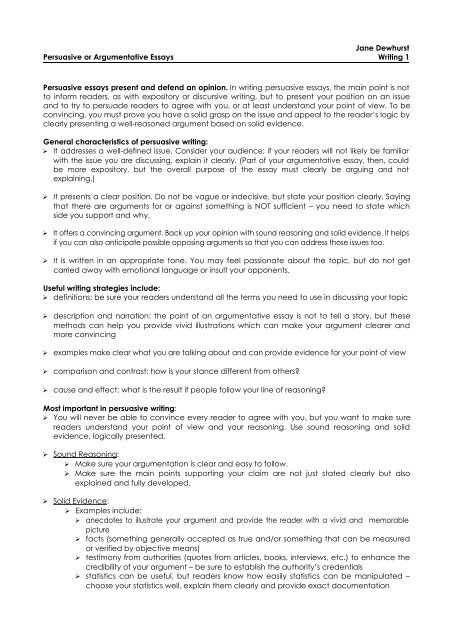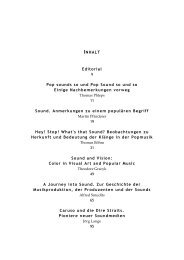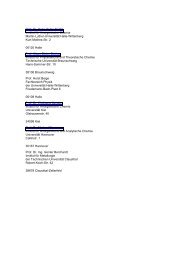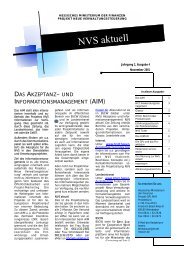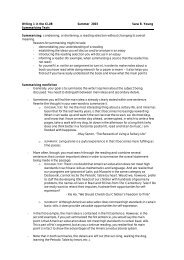Jane Dewhurst Persuasive or Argumentative Essays Writing 1 ...
Jane Dewhurst Persuasive or Argumentative Essays Writing 1 ...
Jane Dewhurst Persuasive or Argumentative Essays Writing 1 ...
You also want an ePaper? Increase the reach of your titles
YUMPU automatically turns print PDFs into web optimized ePapers that Google loves.
<strong>Jane</strong> <strong>Dewhurst</strong><br />
<strong>Persuasive</strong> <strong>or</strong> <strong>Argumentative</strong> <strong>Essays</strong> <strong>Writing</strong> 1<br />
<strong>Persuasive</strong> essays present and defend an opinion. In writing persuasive essays, the main point is not<br />
to inf<strong>or</strong>m readers, as with exposit<strong>or</strong>y <strong>or</strong> discursive writing, but to present your position on an issue<br />
and to try to persuade readers to agree with you, <strong>or</strong> at least understand your point of view. To be<br />
convincing, you must prove you have a solid grasp on the issue and appeal to the reader’s logic by<br />
clearly presenting a well-reasoned argument based on solid evidence.<br />
General characteristics of persuasive writing:<br />
➢ It addresses a well-defined issue. Consider your audience; if your readers will not likely be familiar<br />
with the issue you are discussing, explain it clearly. (Part of your argumentative essay, then, could<br />
be m<strong>or</strong>e exposit<strong>or</strong>y, but the overall purpose of the essay must clearly be arguing and not<br />
explaining.)<br />
➢ It presents a clear position. Do not be vague <strong>or</strong> indecisive, but state your position clearly. Saying<br />
that there are arguments f<strong>or</strong> <strong>or</strong> against something is NOT sufficient – you need to state which<br />
side you supp<strong>or</strong>t and why.<br />
➢ It offers a convincing argument. Back up your opinion with sound reasoning and solid evidence. It helps<br />
if you can also anticipate possible opposing arguments so that you can address those issues too.<br />
➢ It is written in an appropriate tone. You may feel passionate about the topic, but do not get<br />
carried away with emotional language <strong>or</strong> insult your opponents.<br />
Useful writing strategies include:<br />
➢ definitions: be sure your readers understand all the terms you need to use in discussing your topic<br />
➢ description and narration: the point of an argumentative essay is not to tell a st<strong>or</strong>y, but these<br />
methods can help you provide vivid illustrations which can make your argument clearer and<br />
m<strong>or</strong>e convincing<br />
➢ examples make clear what you are talking about and can provide evidence f<strong>or</strong> your point of view<br />
➢ comparison and contrast: how is your stance different from others?<br />
➢ cause and effect: what is the result if people follow your line of reasoning?<br />
Most imp<strong>or</strong>tant in persuasive writing:<br />
➢ You will never be able to convince every reader to agree with you, but you want to make sure<br />
readers understand your point of view and your reasoning. Use sound reasoning and solid<br />
evidence, logically presented.<br />
➢ Sound Reasoning:<br />
➢ Make sure your argumentation is clear and easy to follow.<br />
➢ Make sure the main points supp<strong>or</strong>ting your claim are not just stated clearly but also<br />
explained and fully developed.<br />
➢ Solid Evidence<br />
:<br />
➢ Examples include:<br />
➢ anecdotes to illustrate your argument and provide the reader with a vivid and mem<strong>or</strong>able<br />
picture<br />
➢ facts (something generally accepted as true and/<strong>or</strong> something that can be measured<br />
<strong>or</strong> verified by objective means)<br />
➢ testimony from auth<strong>or</strong>ities (quotes from articles, books, interviews, etc.) to enhance the<br />
credibility of your argument – be sure to establish the auth<strong>or</strong>ity’s credentials<br />
➢ statistics can be useful, but readers know how easily statistics can be manipulated –<br />
choose your statistics well, explain them clearly and provide exact documentation
<strong>Jane</strong> <strong>Dewhurst</strong><br />
<strong>Persuasive</strong> <strong>or</strong> <strong>Argumentative</strong> <strong>Essays</strong> <strong>Writing</strong> 1<br />
➢ textual evidence (especially when writing about a literary w<strong>or</strong>k <strong>or</strong> your argument <strong>or</strong> the<br />
issue is about a particular publication)<br />
➢ In f<strong>or</strong>mal writing, do not present your own experience as evidence, unless you are<br />
referring to academic studies <strong>or</strong> research you have carried out.<br />
➢ Use specific and detailed evidence.<br />
➢ Always indicate the exact source of your inf<strong>or</strong>mation.<br />
➢ When looking f<strong>or</strong> evidence, use a fair representation of samples. Do not only read<br />
sources which supp<strong>or</strong>t your position.<br />
➢ Be sure your inf<strong>or</strong>mation is reliable, and not overly biased. If you are writing about a<br />
political movement, f<strong>or</strong> example, do not only use sources written by members of the<br />
movement.<br />
➢ F<strong>or</strong> inf<strong>or</strong>mation on common logical fallacies (mistakes):<br />
→http://webster.commnet.edu/grammar/composition/argument_logic.htm<br />
Examples of argumentative writing assignments:<br />
➢ in a political science course: Should Germany ref<strong>or</strong>m its immigration laws to allow people to<br />
have dual citizenship?<br />
➢ in an economics course: David M. G<strong>or</strong>don claims in “Class and the Economics of Crime” that<br />
“ghetto crime is committed by people responding quite reasonably to the structure of economic<br />
opp<strong>or</strong>tunities available to them.” Write an essay agreeing <strong>or</strong> disagreeing with this statement.<br />
➢ in a health sciences course: Summarize the debate over using chemical spraying to control the<br />
Mediterranean fruit fly and take a position, arguing f<strong>or</strong> <strong>or</strong> against it. Make clear your reason f<strong>or</strong><br />
taking one side <strong>or</strong> the other.<br />
➢ in a teaching methods course: Should elementary schools require English starting in the first grade?<br />
Sample persuasive essay:<br />
→http://webster.commnet.edu/grammar/composition/crywolf3.htm (with commentary<br />
pointing out imp<strong>or</strong>tant aspects of argumentative writing)<br />
Your assignment (only compuls<strong>or</strong>y f<strong>or</strong> those who require a Leistungsschein):<br />
➢ Write an persuasive essay of at least two pages.<br />
➢ The topic is up to you. Be careful not to choose a topic that is too broad f<strong>or</strong> an essay of this length!<br />
➢ The essay should have:<br />
➢ an interesting title<br />
➢ an introduction that draws the reader into the essay, announces the topic and has a clear<br />
thesis statement<br />
➢ a thesis statement that makes clear what your opinion on the topic is and what you will be<br />
arguing in the essay<br />
➢ NOTE: “There are pros and cons to…” <strong>or</strong> “There are advantages and disadvantages<br />
to this controversial topic…” are acceptable thesis statements f<strong>or</strong> an exposit<strong>or</strong>y<br />
essay which INTRODUCES the reader to a controversial topic <strong>or</strong> a discursive essay,<br />
which presents both sides in a balanced manner. However, they are NOT<br />
acceptable thesis statements f<strong>or</strong> a persuasive essay.<br />
➢ supp<strong>or</strong>ting paragraphs which clearly and logically develop your argument<br />
➢ a conclusion that draws everything together and gives the reader a feeling the essay has<br />
ended and not that the last page is missing.<br />
From : R. B. Axelrod and C. R. Cooper. The St. Martin’s Guide to <strong>Writing</strong>, 4th edition. New Y<strong>or</strong>k: St. Martin’s Press, 1994.


